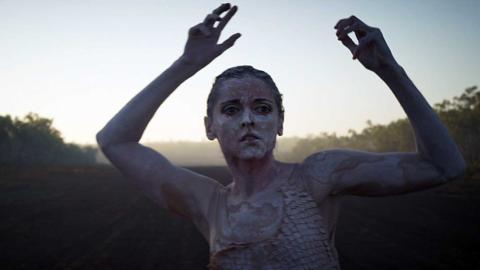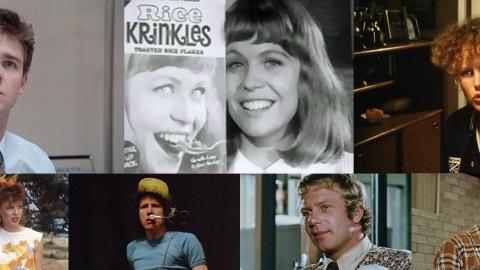

2011: the year of Aussie drama
Australians have enjoyed a feast of fabulous drama on their TV screens this year with Cloudstreet, Crownies, Killing Time, Offspring, Spirited, Packed to the Rafters, Paper Giants, Rush, Rescue Special Ops, Slide, The Slap, Sea Patrol, twentysomething, Underbelly: Razor, Wildboys and Winners and Losers.
ScreenAustralia’s figures for Australian TV drama production show an increase of 12 per cent for 2010/ 2011, the highest expenditure by programs for adults in more than a decade. Oztam ratings for 2011 reinforce that Australians love to hear and see these drama productions. Most of the dramas we have seen this year have been made possible through assistance from screen funding agencies such as ScreenAustralia, Film Victoria, Screen NSW and Screen West and are preserved in the NFSA’s Collection.

'twentysomething' (2011)

'Offspring' series 2 (2011)

'Rush' series 3 (2011)

'Sea Patrol' series 5 (2011)

'Spirited' (2010-11)
It is worth noting that Australians have had to fight to ensure their voice and stories appear on the small screen since the inception of television. The realisation that Australian TV would be dominated by cheaper overseas content was a point of discussion during the 1953 hearings of the Royal Commission into Television.
Melbourne newspaper The Argus on Thursday 21 April 1955 carried an article headed, ‘Actors want TV quotas’.
SYDNEY, Wednesday: The Government should limit overseas productions to 45 per cent of Australia’s television programmes. Mr H Alexander, secretary of Actors’ Equity, said today. Australian artists and productions should make up the other 55 per cent of TV programmes. He said Actors’ Equity would ask the Australian Council of Trade Unions to support the fight for a TV quota. ‘We fear the Australian television market will be flooded with canned entertainment from overseas’, Mr Alexander said.
He was right, Australian TV screens were dominated during the first few years of its existence by productions from the United States and to a lesser extent from England, with shows such as I Love Lucy, Father Knows Best, Our Miss Brooks, The Untouchables and 77 Sunset Strip becoming must-watch viewing. Australian content was relegated to cheaper productions, variety, children’s and game shows. It was not until 1959 that the first Australian drama series was broadcast – GTV 9’s medical drama Emergency – and our first strip drama series began on ATN 7, Autumn Affair. It took until 1960 for Australian television’s regulator, the Australian Broadcasting Control Board (ABCB), to introduce local content requirements, stipulating that 40 per cent of all programs be local, with four hours in prime time per month.
In 1963 the Senate Select Committee on the Encouragement of Australian Productions for Television, chaired by Senator Victor Vincent (known as the Vincent Committee) was established. The report criticised the ABCB for failing to use its powers to enforce local content standards on television broadcasters, particularly the commercial stations. The Vincent Report recommended a sweeping program of reforms, including a call for an Australian drama quota, but sadly no changes resulted, despite urgings from the Producers and Directors’ Guild of Australia.
In 1965 the local content quota was lifted from 40 per cent to 50 per cent but programs from British Commonwealth countries could now be counted as local content. In was not until 1967 that the ABCB introduced a requirement that two hours of local drama be screened on each station each month. And it was to be a decade after the commencement of regular TV transmission that an Australian drama featured in the audience’s top ten television programs, with Homicide (HSV 7 / Crawfords) at number three and My Name’s McGooley, What’s Yours (ATN 7) at number ten in 1966.

Another campaign and perhaps less well-known, which sought to increase Australian content on the small screen, was the ‘TV Make It Australian’ campaign which began in December 1969. The committee was chaired by actor, singer and composer Ted Hamilton, then star of Crawford Production’s Division 4 with committee members Terry Donovan, Chuck Faulkner, Gerard Kennedy – fellow Division 4 actors – and Leonard Teale from Homicide. The campaign was activated by GTV9’s CEO Sir Frank Packer’s decision to replay Division 4 at noon over the Christmas period, during a non-ratings period and receive Australian content credits without paying the actors for these repeat screenings, known as residuals. It was, according to Ted, a way of destroying interest in Australian drama, it was ‘Australian culture on the line’. Meetings were held at the Melbourne Town Hall and in Sydney at the Anzac Town Hall in Artarmon, attracting up to 1000 people. The campaign attracted interest from politicians from both the Liberal and Labor parties (John Gorton, Sir William McMahon, Andrew Peacock, Lionel Murphy, Bob Hawke, Sir Phillip Lynch and Jim McClelland), and coverage in The Age and The Australian in 1970 and 1971. This activism led Ted to enter Australian politics via the Australia Party running for the Senate in the 1970 election.
Listen to an excerpt from Ted‘s oral history interview conducted by Paul Harris on 5 May 2011.
[Hamilton, Ted: interviewed by Paul Harris. Part 1: oral history] NFSA: 1004220
The current Convergence Review set up by the Australian Government will examine the policy and regulatory frameworks that apply to the converged media and communications landscape in Australia. The review will also look at content quotas as an ‘appropriate mechanism for Australian content, including music, children’s and local content’.
It is worth noting on 21 November, United Nations World Television Day – established in 1996 to celebrate the role of television as a communication medium, presenting local and world economic and social issues – that television also plays a vital role in articulating a society’s social and cultural ethos and mores and that these are reflected as much through drama as news, current affairs and documentaries.
The National Film and Sound Archive of Australia acknowledges Australia’s Aboriginal and Torres Strait Islander peoples as the Traditional Custodians of the land on which we work and live and gives respect to their Elders both past and present.


